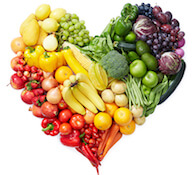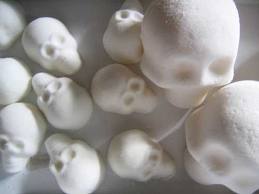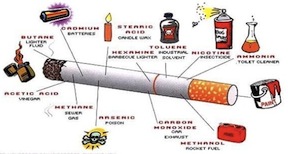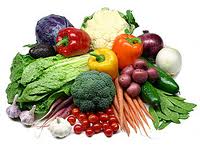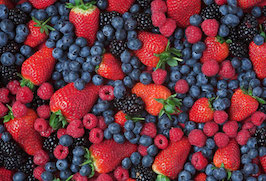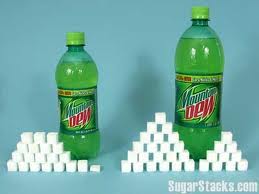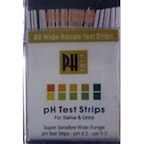-
-
Anti-Cancer Diet, Part 1:
Foods that combat cancer.
Focus
on Vegetables:
Anti-cancer colors are dark
green, red and purple.
Broccoli, Cauliflower, Cabbage
- prevent estrogen dominance. They have a chemical
component called indole-3-carbinol that can combat
breast cancer by converting a cancer promoting
estrogen into a more nurturing variety.
Brussel Sprouts - excellent for
combating breast cancer.
Dark Leafy Greens: Kale,
Collard Greens, Mustard Greens, Turnip Greens, Bok
Choy.
Spinach - Excellent for
protecting against breast and lung cancer.
Cruciferous Vegetables - Broccoli, Cauliflower,
Kale, Brussels Sprouts and Cabbage contain two
antioxidants, lutein and zeaxanthin that combat
cancers.
Kale - nitrogen compounds which may help
prevent conversion of specific lesions to cancerous
cells in estrogen-sensitive tissues. Isothiocyanates
phytochemicals in kale are believed to suppress tumor
growth and block cancer causing substances from
reaching their targets.
Wheatgrass - A shotgun blast to
cancer cells! Chlorophyll content has almost the same
molecular structure as hemoglobin. Chlorophyll
increases hemoglobin production, meaning more oxygen
gets to the cancer.
Selenium and laetrile in wheatgrass are both
anticancer. Chlorophyll and selenium help build the
immune system.
Wheatgrass is one of the most alkaline foods known to
mankind.
Watercress - Lutein content combats cancer cells.
Carrots and Beets (strengthen
kidneys). Both have high glucose content but many
nutrients that over-ride the sugar and kill cancer
cells. Carrots may be eaten raw or preferably
juiced.
Raw Carrots (do not cook) - contain a lot of beta
carotene, which may help reduce several cancers
including mouth, throat, lung, breast, stomach,
intestine, bladder and prostate. Juicing is the best
method, 3-4 glasses daily if desired.
Lentils: According to a study in
the International Journal of Cancer, women who eat
beans and lentils have a significantly lower risk of
developing breast cancer because they contain
antioxidants, fiber and phytoestrogens (also a good
source of protein). Lentils stimulate cancer
preventing enzymes and can help in lowering harmful
estrogen levels.
Mushrooms: Shiitake (stimulates the
immune system), Maitake, Reishi - all have protein
called lectin, which attacks cancerous cells and
prevents them from multiplying.
Hot Peppers - capsaicin, an
ingredient of jalapeno peppers, triggers cancer cell
death by attacking mitochondria (cell power
batteries). Capsaicin, may neutralize certain
cancer-causing substances (nitrosamines).
Habanero Chili
Peppers - attack prostate cancer.
Cayenne Pepper - increases
circulation. Cancer thrives in poor circulation.
Turmeric / Curcumin - inhibits
production of the inflammation related enzyme
content, levels of which are abnormally high in
certain inflammatory diseases and cancers. Tumeric
blocks cancer cell growth. In several studies it was
revealed that turmeric can reduce tumor size by a
81%.
In India, where women consume curcumin, 79 in a
million women develop breast cancer, while in
the USA where women do not consume curcumin,
thousands of women develop breast cancer.
Note:
Turmeric is a natural blood thinner and not
advisable for some cancer patients.
Garlic - Helps blood and tissue
hold more oxygen which cancer hates. Sulphur
compounds are proven to protect against cancer by
neutralizing carcinogens and slowing tumor growth.
Antibacterial and anti-vial.
Allium compounds (dialyl sultides) seem to increase
activity of immune cells that combat cancer and
indirectly aid destruction of cancer causing
substances. Also helps block carcinogens from
entering cells and slows tumor growth.
Diallyl sulfide, a component of garlic oil, has also
been shown to render inactive carcinogens in the
liver. Studies have linked garlic (also onions,
leeks, and chives) to lower risk of stomach and
colon cancer.
Ginger - Found to reduce tumors,
and significant anti-inflammatory effects. Excellent
to reduce nausea and vomiting.
Horseradish - Excellent for
detoxification.
FYI: Veggies should be lightly
steamed, gently sauteed or baked. Cooking breaks
down the tough fiber in vegetables, allowing us to
absorb many more nutrients. Raw is ok, such as for
salads or juicing.
Vegetables offer hundreds of phytonutrients, provide
protection from disease and have the ability to
rebuild the body better than any other food. They
also provide fiber, vitamins and minerals.
Focus
on Fruits:
Choose low sugar fruits. All Berries good for B17
- Raspberries, Strawberries, Blueberries,
Blackberries.
Strawberries - In a 2006 study, the
higher level of ascorbate (vitamin C) antioxidants
found in organic strawberries correlated with a higher
inhibition of breast cancer cell proliferation.
Black Raspberries - may prevent colon cancer.
Rich in antioxidants, thought to have even more
cancer-preventing properties than blueberries and
strawberries.
Apricots B17 - the
apricot seed is inside a hard shell which may be
crushed and sprinkled on food for B17. The Hunza tribe
represent a population that has been cancer free for
over 900 years of its existence. This population has a
natural diet, which supplies on the average between
50-75 milligrams of Vitamin B17 a day.
Eat 1 kernel for every 20 lbs of body weight - e.g.
120 lb person would consume 6 kernels per day. Chew
ground kernel until liquified.
FYI:
1) Good source for Apricot kernels,
B17 (laetrile): hunzagold.com
2) B17 has been found to be most
helpful for colon cancer.
Tomatoes - Loaded with Vitamin C and Lycopene,
an antioxidant that attacks roaming oxygen molecules
(free radicals), suspected of triggering cancer.
Tomatoes cooked in oil (virgin olive oil is ok) may
prevent and shrink prostate cancer.
An increased intake of lycopene has already also been
linked to a reduced risk of breast, pancreas and
colorectal cancer, and also protects from sunburn.
Avocado - rich in glutathione, a powerful
antioxidant that attacks free radicals in the body by
blocking intestinal absorption of certain fats. More
potassium than bananas and a strong source of
beta-carotene.
Scientists believe avocados may also be useful in
treating viral hepatitis (a cause of liver cancer), as
well as other sources of liver damage. Packed with
nutrition, a superb food for cancer patients. High in
'good' fat.
High glucose content fruits but excellent for
fighting cancer:
Purple / Red Grapes - seeds may be eaten also.
Rich source of resveratrol, which inhibits the enzymes
that stimulate cancer cell growth and suppress immune
response. Grapes also contain ellagic acid, a compound
that blocks certain enzymes necessary for cancer
cells.
Pineapple - Digestive enzyme is Bromelain. It
helps to de-shield the cancer cells protective protein
coating, caused by consuming animal protein. Pineapple
contains natural pancreatic enzymes (papaya also but
only eat organic).
Grapefruits - best eaten for cancer prevention
by sweeping carcinogens out of the body. Studies have
shown that grapefruit possibly inhibits proliferation
of breast-cancer cells in vitro. Citrus fruits have an
acidic ph before entering the body but leave an
alkaline residue once they have been metabolized.
Note: Cannot be eaten if on
medication, will cause nausea.
Coconut meat, coconut milk or coconut
yogurt.
FYI:
1) Enzymes - It is
often best to juice on an empty stomach so more
enzymes can get into the body and work their best.
Juice the core of the pineapple for maximum bromelain
benefit.
2) Citrus fruits
inhibit the formation of cancerous cells. Vitamin C
strengthens the immune system.
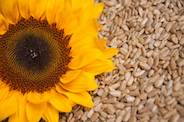
Raw
seeds and sprouts:
Brocco Sprouts, Alfalfa - Brown
Sesame, Sunflower, Pumpkin Seeds.
Soak seeds in water so their protective enzyme
inhibitors are removed and the enzymes - which
have been "asleep," become active - in three days
the nutritional values of the seeds are well
increased and the seeds become much easier to
digest.
Brocco Sprouts - contain phytochemical
sulforaphane (a product of glucoraphanin) 20 times
higher than regular broccoli - believed to aid in
preventing some types of cancer, such as colon and
rectal cancer. An exceptionally rich source of
inducers of enzymes that protect against chemical
carcinogens.
Nuts:
High in protein - best when soaked overnight in
water.
Raw Walnuts, Almonds, Macadamia -
best eaten for prevention. Recommended for
prostate and breast cancer, packed with Omega 3,
and protein.
Raw Brazil Nuts - selenium, very
important for prostate cancer and breast cancer.
Cancer patients tend to have very low selenium
levels.
FYI: Be very careful
of nuts as they tend to become moldy. Keep intake
to a minimum. Avoid peanuts as they are highly
toxic.
Hemp Seed Oil for salad
dressing - Excellent source of Omega 3 and 6.
Avocado Oil and Flax Seed Oil may be
used for salad dressing.
Flax Seed Oil (unrefined, organic) - Omega oils
protect you from cancer and inhibits tumor growth
(especially breast cancer). Should be taken daily
by all cancer patients - two tablespoons can be
used as a salad dressing.
Ground flax seeds contain both the fiber and the
oil, and have more potent anticancer properties
than flax oil alone. Flax seed contains lignans
which block or suppress cancerous changes and
inhibit cancer cell growth.
Virgin Olive Oil - Most oils will cause havoc on
your hormonal system, and induce cancer causing
hormones. Greek women, who tend to eat a diet rich
in olive oil, have a very low rate of breast
cancer. Use for salad dressing.
Raw Sesame Tahini -
The oil reduces estrogen. Recommended daily,
especially with breast cancer.
Beverages:
Alkaline Water /
Ionized Water on occasion (does not
hydrate as well as regular water) - all water
should be drunk at room temperature, never ice
cold.
Coconut Water from young coconuts (white
shell, not brown). Excellent for combating damage
done by chemotherapy. It is an electrolyte, it
oxygenates the blood, and restores the ANC count,
white blood count, hemoglobin, and platelets.
Essiac Tea -
Discovered by Canadian nurse Rene Caisse, proven
to combat cancer.
Green Tea - A potent antioxidant and
anti-inflammatory agent. Several polyphenols, the
potent antioxidants green tea's famous for, seem
to help keep cancer cells from gaining a foothold
in the body, by discouraging their growth and then
squelching the creation of new blood vessels that
tumors need to thrive.
Study after study has found that people who
regularly drink green tea reduce their risk of
breast, liver, skin, lung, stomach, esophagus,
colon, and prostate cancer.
Papaya Leaf Tea - an effective anti-cancer
agent against cervix, breast, liver, lung and
pancreas cancers. Research indicates that papaya
extract induces cell death.
Focus on
Seafood:
Iodine: Found in seaweed and
some fish. Japanese women consume 25 times more
dietary iodine than North American women and have
lower breast cancer rates. Iodine consumption by
Americans has dropped 50% since the 1970s as
breast cancer rates have risen. Kelp is the best
source.
Other sources include shrimp, haddock, cod,
herring, halibut, and sardines. Iodine both
prevents and combats cancer, and is proven to thin
the lymph fluid, thus aiding the lymph system
which plays an integral role in cancer therapy.
Brown Seaweed - Modifilan, Laminaria (good
for breast cancer) - contains at least 3 nutrients
that kill cancer cells; furanone, fuecoiden, and
algenic acid.
Sea Veggies - Nori, kelp, wakame, kombu,
hizike, and dulce. High in iodine which is
depleted in Cancer bodies.
Fish - Wild Alaskan Salmon or Alaskan Cod
(NO farm raised fish). Sardines for calcium is
most preferred choice of fish with least amount of
toxic pollution. Fresh tuna ok but only once a
week (radiation from Fukushima and mercury
contamination). NO coastal fish or shellfish, or
shrimp (toxic metals and carcinogens). No smoked
fish.
Omega 3 fatty acids - found in fish, block
the effect of estrogen on breast cells, thus
lowering the risk of them becoming cancerous.
Eskimo women who have a high concentration of
omega 3 in their diet have a lower incidence of
breast cancer.
FYI: The oceans are severely
polluted with heavy metal poisons and radiation -
including the Pacific coastline (Fukushima), and
the Gulf of Mexico (oil and chemical
contamination). Eating anything from the ocean and
rivers will contain a certain level of toxicity.
Plant
Protein:
Apart from greens, nuts, seeds and sprouts, Hemp
Hearts are one of the very best sources
of concentrated protein, essential fats and
vitamins found in nature.
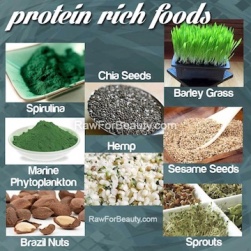
|


